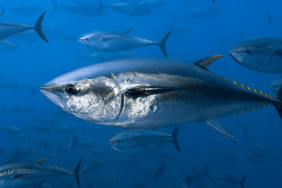CONSERVATION DISCUSSION: HUMAN ACTIVITY POSES A THREAT TO SPERM WHALE POPULATIONS
By: Sani Firmansyah (Supporter Center Officer WWF-Indonesia)
The sperm whale stranding incident that occurred some time ago aroused curiosity about this marine mammal. Not many people know that sperm whales have a migratory route in Indonesia. Answering this curiosity, WWF-Indonesia organized a Conservation Discussion entitled "What's wrong with sperm whales?" which was held at the Jakarta Creative Hub on Friday (16/3).
The discussion that presented Sheyka N. Fadela, Marine Species Conservation Assistant WWWF-Indonesia was greeted enthusiastically. Sheyka said that human activity is a threat to the sperm whale population. Currently, its conservation status has entered vulnerable (vulnerable) status. One of the human activities that threaten the lives of sperm whales is the habit of throwing garbage into the sea, be it plastic waste or other waste. "In Germany, one was stranded and when the stomach was dissected, the contents were plastic waste," said Sheyka, when met after the discussion. "But, indeed, plastic waste is not only what causes death in whales, but worsens the condition of sperm whales and marine ecosystems," she added.
According to Sheyka, plastic waste is dangerous for sperm whales because when it is ingested, it is as if it has eaten but there are no nutrients that it gets because it only swallows garbage. Even worse, the waste can actually be toxic to sperm whales. "Ingested plastic waste makes the whale have no appetite (because it feels full). And secondly, it carries germs that can affect the health of the whales," Sheyka explains. It is feared that the germs or bacteria carried by the waste when ingested by the whales will stick to their bodies and cause disease. Sheyka is also concerned that the chemicals in the plastic could poison the whales that eat it.
In addition to garbage, which also pollutes the oceans, another threat to the survival of sperm whales is due to seismic activity. For example, the use of air guns such as those used by oil and gas companies or those generated by ships and military activities. When an air gun is fired at the seafloor, its sound waves interfere with the communication of sperm whales. This communication disruption is thought to be one of the causes of sperm whale strandings. Because communication is disrupted, they get lost and find themselves in shallow water. This is one of the reasons why whales are often stranded on beaches.
The foreign sounds produced also startled the sperm whales. "Because they are startled, they quickly swim up. This is the same as when divers swim up too fast. They will experience decompression," Sheyka said. Decompression can cause nitrogen bubbles that then block blood flow, leading to strokes and paralysis.
"An eco-friendly lifestyle such as disposing of garbage in the right place is not enough to maintain marine biodiversity. Being wise in consuming seafood and education are efforts that we can jointly do to maintain the existence of sperm whales," said Shyeka.
The conservation discussion also gave new insights to the public who have been supporting WWF-Indonesia's conservation programs by becoming WWF Supporters. "I realized that what we do and consume in the city can affect the existence of ecosystems in nature, as well as sperm whales. Thank you WWF-Indonesia for providing information through this Conservation Discussion," said Annete Siagian, WWF-Indonesia Supporter.





